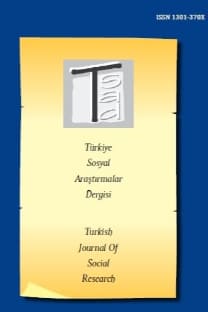Sakarya Üniversitesi Beden Eğitimi ve Spor Öğretmenliği Bölümünde Okuyan 1. ve 4. Sınıf Öğrencilerinin Beslenme Bilgi ve Tutumlarının Karşılaştırılması
Bu çalışma, üniversite öğrencilerine verilen beslenme eğitiminin öğrencilerin beslenme tutum ve davranışlarında ne gibi değişikliğe neden olduğunu belirlemek ve aynı zamanda verilen beslenme eğitiminin etkinliğini değerlendirmek amacıyla yapılmıştır. Bu amaçla, araştırmamızın örneklemini Beden Eğitimi ve spor öğretmenliği bölümünde okuyan 1. sınıf öğrencileri 38 ve 4. sınıf öğrencileri 39 olmak üzere toplam 77 öğrenci oluşturmuştur. Araştırmaya katılan 1. sınıf öğrencileri beslenme eğitimi almamış olup 4. sınıf öğrencileri ise beslenme eğitimini almıştır. Araştırmaya başlarken literatür taraması yapılmış beslenme ile ilgili gerekli bilgiler verilmiş, daha sonra anket hazırlanarak öğrencilere uygulanmıştır. Anket verileri SPSS paket programına girilmiş ve crosstabs testi uygulanmıştır. Sonuç olarak beslenme eğitimi alan öğrencilerle almayan öğrenciler arasında P
Comparison of Knowledge and Attitudes Toward Nutrition Between First and Fourth Class Students' of Sakarya University Department of Physical Education and Sports Teaching
This work has been prepared to determine how the nourishment education given to university students changes the behaviors and attitudes of nourishment of the students, to get new opinions about the ideal teaching methods by evaluating the efficiency of the nourishment education and to give suggestions to relevant institutions. 38 students studying at the first class and 39 students studying at the fourth class of the Department of the Physical Education and Sport Training, total 77 students constitute the sample of this research. Students, who study at the first class, haven’t got the education of nourishment and students who study at the fourth got the education of nourishment. At the beginning of the research, literature has been scanned and necessary information about nourishment has been given and then a questionary has been applied to the students. Questionary data was entered to the SPSS packet program and crosstabs test was applied. As a result, there were no differences found between of the students who didn’t get the nourishment lesson and get the nourishment lesson in the P< 0,05 grade. At the end of the research, it has been found that the lesson of nourishment is given efficiently to the samples but in their daily life what they do as an application are deficient, wrong, and the habits aren’t abandon by them and their knowledge isn’t enough. Besides, the impact of social-cultural form and the bad economic conditions of the students these results have been found. The education of nourishment which has been active and permanently impacts the knowledge and the attitude positively and also as a result it’s important to correct the wrong beliefs and attitudes.
___
- AÇIKADA, Caner ve Emin Ergen (1985), “Sporcu Beslenmesi”, Bilim Teknik Dergisi, Cilt 18, Sayı 213, Ağustos, s.42.
- ASMA, Bülent, (1987), Ankara Üniversitesinde Spor Yapan Öğrencilerin Beslenme Durumları ve Fiziki Performansları Üzerinde Bir Araştırma, Yüksek Lisans Tezi, Ankara üniversitesi, Fen Bilimleri Enstitüsü. s.125.
- AYTEKİN, Fulya, (1999), Üniversite Öğrencilerine Verilecek Beslenme Eğitiminin Beslenme Davranışlarına Olan Etkisinin İncelenmesi, Doktora Tezi, Gazi üniversitesi, Sosyal Bilimler Enstitüsü. s.214.
- BAYSAL Ayşe (2002), Beslenme Kültürümüz, Kültür Bakanlığı Yayınları, Türk Tarih Kurumu Basımevi, Ankara. s.7.
- BAYSAL, Ayşe (1997), Genel Beslenme, Hatipoğlu Yayınevi, Ankara. s.9.
- BAYSAL Ayşe (1993), Beslenme Kültürümüz, Kültür Bakanlığı Yayınları, Levent Ofset Matbaacılık ve Yayıncılık, Ankara. s. 3–5.
- ÇOPUR, Utku (2000), Gıda Teknolojisi, Devlet Kitapları, Ilıcak Matbaası, İstanbul.s.12–14.
- DİRİCAN, Rahmi ve Rahmi Bilgel (1993), Halk Sağlığı, Uludağ Üniversitesi Basımevi, Bursa. s.249.
- ERSOY, Gülgün (1995), Sağlıklı Yaşam Spor ve Beslenme, Damla Matbaacılık, Ankara. s.14.
- FİŞEK, Nusret (1983), Halk Sağlığına Giriş, Çağ Matbaası, Ankara. s. 70– 73.
- GÜRMAN, Ülker (2004),Yemek Pişirme Teknikleri ve Uygulamaları 1, Devlet Kitapları Müdürlüğü, İstanbul. s.1.
- GÜRSOY, Ömer (2005), “Güreşte Beslenme İlkeleri”,
- http://www.guresdosyasi.com/makale1.html 23.11.2005.
- IŞIKSOLUĞU, Müberra (2003), Beslenme, Milli Eğitim Bakanlığı Yayınları, İstanbul. s.3–17.
- ÖZDEMİR, Günay (2002), Dumlupınar Üniversitesi Beden Eğitimi ve Spor Yüksekokulunda Okuyan ve Aktif Spor Yapan Öğrencilerinin Beslenme Alışkanlıklarının Tespiti ve Değerlendirilmesi, Yüksek Lisans Tezi, Dumlupınar Üniversitesi, Sosyal Bilimler Enstitüsü. s. 142-151.
- SALMAN ŞAHİN, Selma, (1986), Üniversite Son Sınıf Kız Öğrencilerinin Sağlık, Spor ve Beslenme Alışkanlıkları Üzerine Bir Araştırma, Yüksek Lisans Tezi, Gazi Üniversitesi, Sosyal Bilimler Enstitüsü. s. 82-89.
- YILMAZ, Gürkan, (2002), Niğde Üniversitesi BESYO Öğrencilerinin Beslenme Kahvaltı Alışkanlıklarının Değerlendirilmesi, Yüksek Lisans Tezi, Niğde Üniversitesi, Sosyal Bilimler Enstitüsü. s.56–63.
- ZEKİ, Düreyt, (2000), Sporcuların Beslenme Alışkanlıkları, Yüksek Lisans Tezi, Uludağ Üniversitesi, Sağlık Bilimleri Enstitüsü. s.3–4.
- ISSN: 1301-370X
- Başlangıç: 2015
- Yayıncı: AKADEMİSYENLER BİRLİĞİ DERNEĞİ
